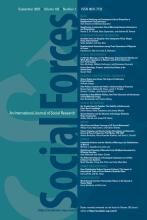Does anti-Black racism harm White Americans? We advance hypotheses that address this question within the neighborhood context. Hypotheses are tested with neighborhood and survey data from a probability sample of White residents of Nashville, Tennessee. We find that regardless of neighborhood crime rates or socioeconomic compositions, Whites report heightened perceptions of crime and danger in their neighborhoods as the proportion of Black residents increases. Perceived neighborhood danger, in turn, predicts increased symptoms of psychophysiological distress. When stratified by socioeconomic status (SES), however, low-SES Whites also report perceptions of higher status when living near more Black neighbors, which entirely offsets their distress. We conclude that while anti-Black racism can ironically harm the health of White Americans, compensatory racist ideologies can also offset these harms, particularly for lower-status Whites. We situate our findings within broader discussions of anti-Black racism, residential segregation, and psychiatric disorders commonly observed among White Americans.
